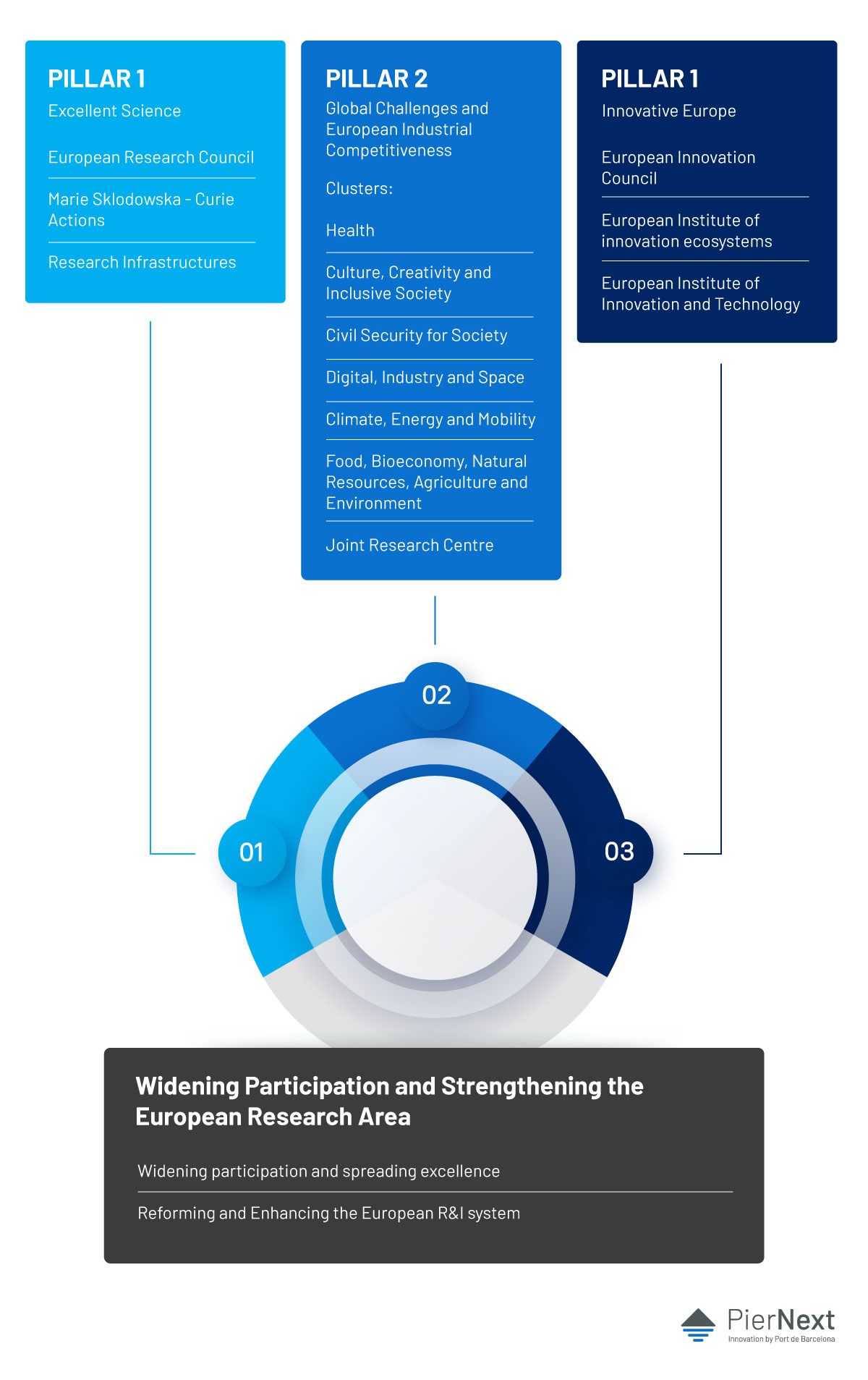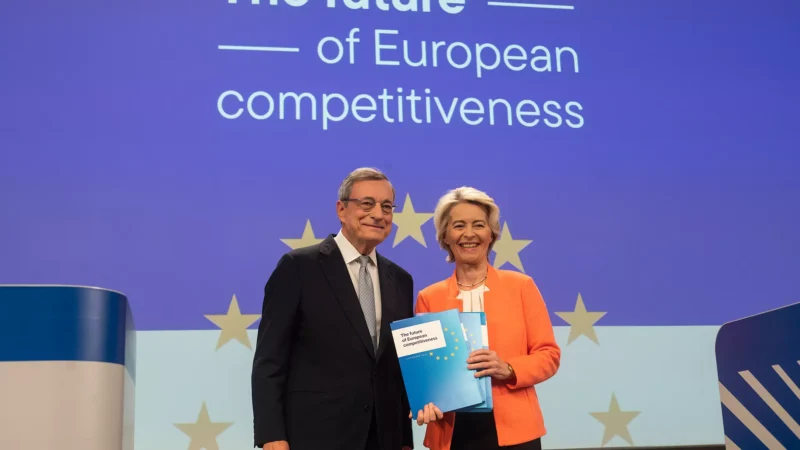 Horizon Europe consists of three pillars and horizontal actions that aim to boost the EU's scientific competitiveness, research and innovation. (GettyImages)
Horizon Europe consists of three pillars and horizontal actions that aim to boost the EU's scientific competitiveness, research and innovation. (GettyImages)
Funding research: Horizon Europe’s new work programme 2023-2024
The European Commission has adopted the Roadmap 2023-2024 of the Horizon Europe programme. Horizon Europe is the main instrument for funding research and innovation in Europe for the period 2021-2027, the successor to the Horizon 2020 programme.

Carles Rúa is the Chief Innovation Officer at the Port de Barcelona and Director of the Master’s degree in Executive in Supply Chain Management at the UPC.
 Horizon Europe consists of three pillars and horizontal actions that aim to boost the EU's scientific competitiveness, research and innovation. (GettyImages)
Horizon Europe consists of three pillars and horizontal actions that aim to boost the EU's scientific competitiveness, research and innovation. (GettyImages)
This work programme will cover the years 2023-2024. The main elements of the programme are:
- Marie Skłodowska-Curie programme actions and major research infrastructures under Pillar I.
- The 6 European development clusters under Pillar II
- The European Innovation Ecosystem under Pillar IIII
- Widening participation and improving the European Research Area.
It also promotes funding from:
- European Research Council (ERC)
- Joint Research Centre (JRC)
- European Innovation Council (EIC)
As stated in its introduction, the Horizon Europe programme will build "more connected and efficient European innovation ecosystems, create world-class research infrastructures, support the green and digital transitions and focus on global challenges, while supporting European industrial competitiveness, including EU missions. Finally, it will broaden participation in the programme and strengthen the European Research Area".
Horizon Europe, a strategic program
Horizon Europe is the European Union's Framework Programme for research and innovation funding. It is the largest European R&D funding programme, with a budget of €95.5 billion for its 2021-2027 period. Most of this funding is allocated on the basis of competitive calls for proposals, which are set out in the work programmes.

The objectives of the Horizon Europe programme are set out in the Horizon Europe Strategic Plan 2021-2024, adopted in March 2021.
This strategic plan "sets out the strategic orientations for establishing investments in the first four years of the programme. It ensures that EU research and innovation actions contribute to EU priorities, including a climate-neutral and green Europe, a Europe fit for the digital age and an economy that works for people".
Thus, based on EU policy priorities, the Strategic Plan defines four key strategic orientations and 32 expected impacts.
The four strategic orientations defined are:
1. Promote open strategic autonomy by leading the development of key digital, enabling and emerging technologies, sectors and value chains.
Areas of European autonomy include artificial intelligence, robotics and data management, quantum computing, cybersecurity, strategic raw material value chains or creative industries.
2. Restore Europe's ecosystems and biodiversity and sustainably manage natural resources.
This means boosting research into sustainable crops, fisheries and aquaculture, food processing systems, new sources of protein, pollution prevention, biodiversity restoration, ecosystem restoration, etc.
3. Making Europe the first circular, climate-neutral and sustainable digital economy.
This strategic line aims to seek solutions to the energy transition, develop new technologies linked to renewables, achieve a competitive, sustainable and European value chain for batteries, promote safe, resilient and clean transport for people and goods, research into climate-neutral, circular and digital production methods, etc.
4. Create a more resilient, inclusive and democratic European society.
In this line, it seeks, among other things, to personalise care for people in vulnerable situations, protect and improve European democracy, improve the continent's resilience, especially in health emergencies, and promote inclusive growth and the development of new job opportunities.
The three pillars of Horizon Europe
Horizon Europe consists of three pillars and horizontal actions. The relationship between the pillars and the horizontal actions is presented in the infographic below:

Pillar 1: Excellent science
The objective is to boost the EU's scientific competitiveness in the world.
Wants to achieve this by:
- Supports cutting-edge research initiatives led by world-class researchers through the European Research Council.
- Providing funding for experienced researchers and doctoral training networks through the Marie Skłodowska-Curie Actions
- Investing in cutting-edge research infrastructures.
Pillar II: Global Challenges and Industrial Competitiveness
Focuses on supporting research related to prioritizing societal problems and strengthening technological and industrial capacities through clusters. It sets out EU missions with ambitious objectives to address major challenges. It includes the work of the Joint Research Centre, which provides policy makers with independent scientific evidence and technical support.
This pillar aims to improve the competitiveness of European industry. The six proposed clusters and their budgets are:
| Clúster 1 | Health | 8.246 millones EUR |
| Clúster 2 | Culture, creativity and inclusive society | 2.280 millones EUR |
| Clúster 3 | Civil security for society | 1.596 millones EUR |
| Clúster 4 | Digital, industry and space | 15.349 millones EUR |
| Clúster 5 | Climate, energy and mobility | 15.123 millones EUR |
| Clúster 6 | Food, bioeconomy, natural resources, agriculture and environment | 8.952 millones EUR |
Pillar III: Innovative Europe
It aims to position Europe as a leader in creating an innovation market through the European Innovation Council. It also contributes to shaping the overall innovation landscape in Europe through the creation of European innovation ecosystems and through the European Institute of Innovation and Technology, which promotes the integration of education, research and innovation. This pillar aims to boost Europe's innovative capacities.
The horizontal actions Widening Participation and Strengthening the European Research Area work to help EU Member States maximise their national research and innovation potential and promote the free movement of researchers, scientific knowledge and technology. This pillar aims to support the development of a strong and interconnected research environment in Europe.
Hundreds of calls for proposals for EU-funded research and innovation projects will be announced over the next two years
European missions
Horizon Europe has introduced the concept of Missions in its work programme. These Missions address the major global challenges that affect the daily lives of Europeans by better linking EU research and innovation to the needs of society and citizens, generating high visibility and impact.
To this end, they set clear, concrete, ambitious and at the same time realistic objectives to be achieved by 2030.
Thus, Europe has defined five Missions:
- Adaptation to climate change. Supporting at least 150 European regions and communities to become resilient to climate change by 2030.
- Fighting cancer. Working with the European Cancer Plan to improve the lives of more than 3 million people by 2030 through prevention and treatment and providing solutions to live longer and better lives.
- Restoring our oceans and waters by 2030 by protecting 30% of EU waters and 25,000 km of river waters.
- 100 smart and climate neutral cities by 2030. In April 2022, 112 cities were selected to participate in this Mission.
- Development of a Soil Pact for Europe, focusing on the creation of 100 "living laboratories" and "lighthouses" to lead the transition to healthy soils by 2030.
More than 600 million euros will be invested in these five missions by 2023.
International cooperation
Horizon Europe's work plan for 2023-2024 includes actions to support and strengthen international initiatives in areas such as renewable energies, food systems, health or environment, among others. It builds on the Africa Initiative and introduces the new Mediterranean Initiative, which is the result of the new research and innovation agenda developed with the Union for the Mediterranean.
How does the Horizon Europe Roadmap 2023-2024 unfold?
The Work Programme approved last December provides some €13.5 billion to fund researchers and innovators in Europe to develop disruptive solutions to major environmental, energy, digital and geopolitical challenges.
A large part of the budget (€5.67 billion, 42% of the total) will go towards meeting climate change targets, including €1.67 billion to improve biodiversity. Another 4.5 billion (34% of the total) will be dedicated to the digital transition and 970 million (8%) will be dedicated to making Europe more secure and resilient.
This Work Programme includes €1 billion in 2023 from NextGenerationEU funds for Europe's recovery from the COVID-19 pandemic.
As mentioned above, most of the funding takes the form of calls for proposals where the best initiatives that meet the requirements of each call are selected on a competitive basis.
These calls are grouped into coherent packages called 'destinations'. Each destination describes an EU socio-economic challenge to which R&D activities can contribute. Many of these destinations correspond directly to one of the 32 impacts expected in the Horizon Europe Strategic Plan 2021-2024 and, in any case, all of them are covered by the different calls.
For example, cluster 5, "Climate, energy and mobility" includes the following destinations:
- Climate science and responses for the transformation towards climate neutrality.
- Cross-sectoral solutions for climate transition
- Sustainable, secure and competitive energy supply
- Efficient, sustainable and inclusive energy use
- Clean and competitive solutions for all transport modes
- Safe and resilient transport and smart mobility services for passengers and freight
Numerous calls for proposals have been established for each destination. For example, the 'Clean and competitive solutions for all modes of transport' destination includes, among many others, calls as diverse as:
- "Innovative battery management systems for new generation vehicles".
- "Hydrogen-powered aviation".
- "Demonstrations to accelerate the move to the safe use of new sustainable and climate-neutral fuels in aquatic applications".
- "Reducing the environmental impact of shipyards and developing a comprehensive strategy to measure and minimise the non-operational environmental impact of shipping".
- "New designs, shapes and functionalities of light commercial vehicles".
- "Achieving efficient, high voltage, low weight electric powertrains for sustainable waterborne transport".
In short, more than 1000 calls for proposals for EU-funded research and innovation projects will be announced over the next two years. The first ones were announced on 7 December and can be found, with all the other relevant information, on the EU Funding & Tenders portal.





